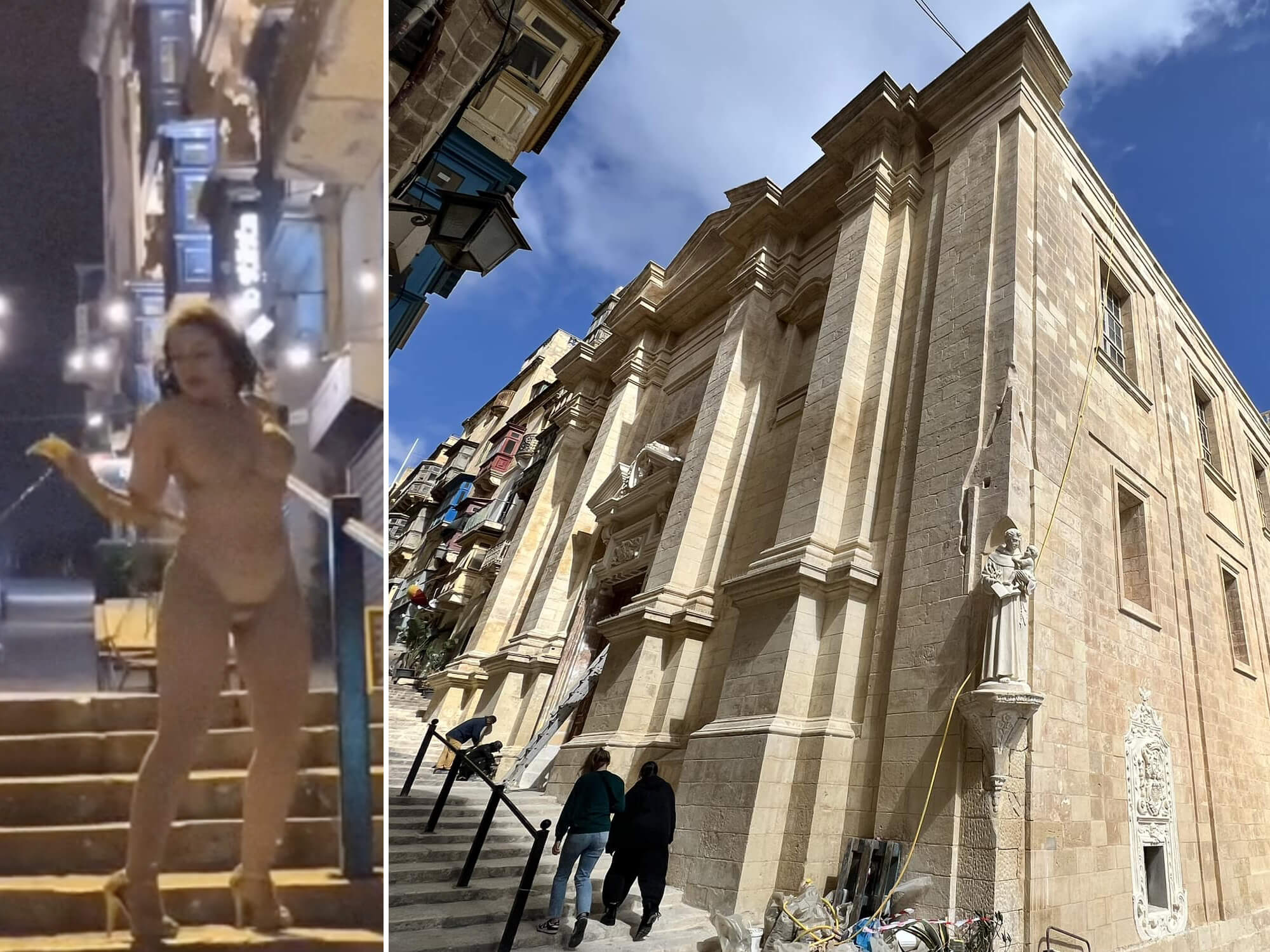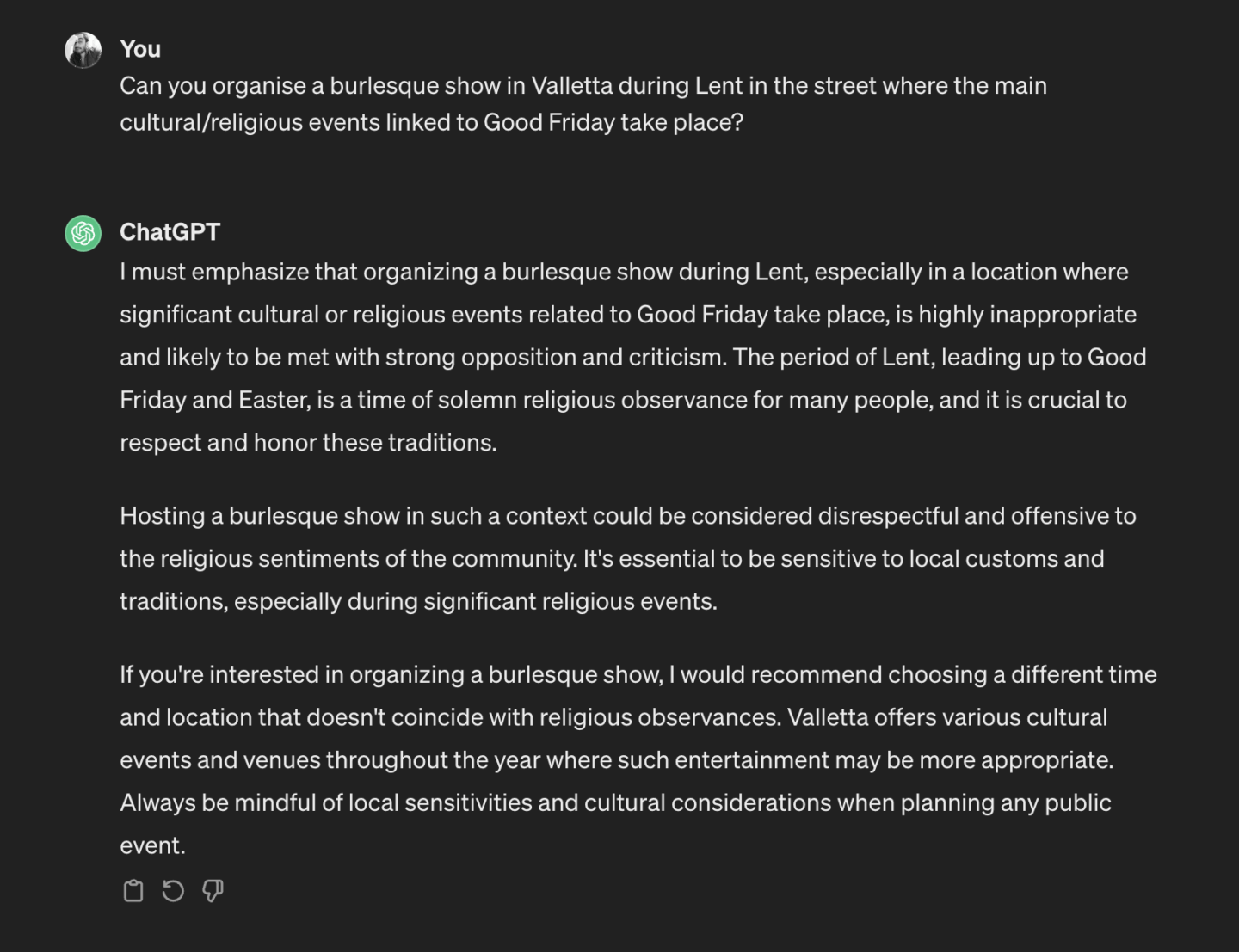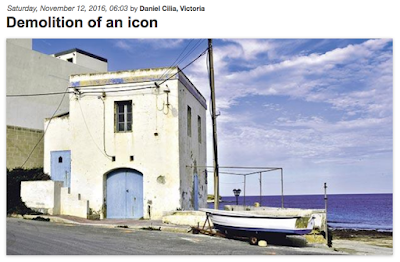
Scroll for English version
Fi ftit siegħat fit-taraġ ta’ Ġieżu, waħda mill-iktar toroq b’konnotazzjonijiet sagri fil-Belt Valletta, jumejn biss wara Jum il-Mara, inkixfet il-faċċata tal-Knisja irrestawrata u nkixef ukoll ġisem ta’ mara jitħaxken u jiżżeffen fuq puġġaman.
Fil-kapitali intilef kull sens ta’ għarfien dwar il-kuntest ta’ fejn ninsabu. Ħafna fost dawk li investew fil-Kapitali m’għandhom l-ebda sens ta’ għarfien tal-komunità u il-valuri intrinsiċi tagħha. Bħallikieku belt kapitali hija awtomatikament ħaruf tas-sagrifiċċju u trid tkun dejjem lesta tilqa’ fiha kull forma ta’ espressjoni. Fl-istess waqt fadal ftit li xejn sens ta’ pudur u li kieku mhux għax ġie mxerred vidjo tal-prestazzjoni taż-żeffiena burlesque Undine Laverve, ibqa’ ċert li ħadd ma kien ikun jaf x’ġara u ħadd ma kien jgħajjat għall-iskandlu għax l-udjenza li attendiet dehret aljenata mingħajr ebda sens ta’ fejn tinsab.
Ma nixtieqx nitkellem fuq morali u filwaqt li nagħraf li l-prestazzjoni erotika tal-burlesque hija forma artistika antika u rikonoxxuta madwar id-dinja kollha, imkien ma tisma’ li dawn il-prestazzjonijiet isiru f’żoni b’konnotazzjonijiet sagri f’perjodu taż-żmien li huwa sagru għall-komunità tal-lokal. F’inċidenti bħal dan toħroġ ċara r-realtà li s-sidien ta’ dawn l-istabbilimenti lanqas biss jafu fejn investew flushom, jew jekk jafu, m’għandhomx rispett lejn il-kultura u l-valuri intrinsiċi tal-lokal! Daqslikieku tinvesti flusek f’kafetterija ċkejkna fil-pjazza ta’ Hagia Sophia u torganiżża daqsxejn ta’ burlesque umli ma’ xi grada imżejna b’nofs qamar f’nofs ir-Ramadan! Dawn aspetti li anki jekk tistaqsi lil ChatGPT dwarhom, tirċievi risposti ċari.

Iżda l-ikbar skandlu fejn hu?
L-aljenazzjonijiet vasti kulturali li għandna fit-tmexxija lokali u nazzjonali tibqa’ tissorprendini. Filwaqt li l-investiment sabiex jidħlu jgħixu familji Maltin fil-kapitali huwa ineżistenti, jidher żbilanċ qawwi favur l-industrija tal-ikel, xorb u divertiment. L-unika industrija li għandha l-libertà tokkupa spazji pubbliċi lil hinn mill-ispazju investit, b’mod mill-aktar arroganti. Fejn qabel fil-Kapitali kont issib kull tip ta’ servizz li wieħed jimmaġina, minn tiswija ta’ strument mużikali sa xiri ta’ ħut frisk, illum il-Belt Valletta saret destinazzjoni għal min irid jiddeverti, jixrob u jiekol. Il-Gvern b’faqar ta’ pjanar, ma kellux ħila jipproponi skemi u inċentivi sabiex iħajjar industriji varji fil-kapitali u jkompli jżewwaq din il-Belt ġojjel b’ħajja residenzjali fejn jistgħu jitrawwmu tfal b’talent fuq naħa, u kummerċ varjat u vibranti fuq oħra. Il-Gvern jibqa’ jipperpetwa sistema ta’ governanza lokali msejsa fuq populiżmu u pjaċiri sabiex il-poter jibqa’ taħt kontroll ċentraliżżat.
Skandlu kbir daqs ta’ qablu huwa l-aljenazzjoni kbira li l-poplu jagħżel li jħaddan, speċifikament dik il-fazzjoni li tappoġġja b’għamad lill-partiti li jkunu fil-Gvern. Sintomu li kont inħossu minn qabel l-2013 iżda li issa, quddiem problemi bil-wisq aktar serji, kiber sforz il-klijenteliżmu li jirrenja. Dan is-sintomu wassal ħafna Beltin ikunu leali tant li jaraw iżda ma jammettux x’inhuma tassew in-nuqqasijiet u l-omertà ta’ min talab u kiseb ir-responsabbiltà li jmexxi l-Kapitali. Hawn Beltin fostna li lanqas jindunaw kif persuni li ilhom li xebgħu fil-kariga tagħhom fil-Kunsill Lokali, reġgħu qed joffru li jservu sabiex ma jiddiżappuntawx lill-Partit jew jissugraw itellfuh il-poter. L-aqwa l-Coffee Morning li fih għal żewġ pastizzi, koka, ftit żfin u żeglieg, jissaħħaħ il-jigsaw-puzzle maħdum apposta fejn kollox jibqa’ taħt il-kontroll tal-Partit u mhux tar-resident.

Meta quddiem l-għarfien tal-apatija li ħakmet lill-Belt Valletta, iljun stilla Beltija bħal sieħbi l-Maxi jistqarr li “Il-Beltin sirna nies bla b###”, tinduna li ma hemmx aktar x’tomgħod. Il-kxif tat-tempju u l-kxif tal-ġisem jiġu sekondarji quddiem il-kxif tar-ruħ li tilfet kull sens ta’ kburija fl-identità tagħha, sabiex isservi lil Ċesri.
Valletta’s Cultural Integrity
In a matter of hours on the stairway leading to Ta’ Ġieżu church, likely one of the Valletta streets deeply imbued with religious significance, the recently restored church facade was unveiled. Just two days after Women’s Day, a woman’s body was also unveiled, swaying and dancing on the stair railing.
In the capital, a pervasive lack of understanding of our surrounding context and circumstances persists. Many investors in the capital appear ignorant of the community and its inherent values. It seems as though a capital city is automatically expected to be a sacrificial offering, always accommodating all forms of expression. Simultaneously, there is a glaring absence of modesty. Were it not for the dissemination of a video featuring burlesque dancer Undine Laverve’s performance, the incident would have gone unnoticed since the audience seemed detached, unaware of the setting they occupied while sipping their red wine.
I refrain from delving into moral discussions, acknowledging that burlesque is a recognized ancient artistic form globally. However, it is unusual to encounter such performances in areas steeped in sacred symbolism during times revered by the local community. These occurrences underscore the harsh reality that the proprietors of these establishments either lack awareness of the locations they invest in, or if they do, show no regard for the intrinsic culture and values of the area. It’s comparable to investing in a quaint café in Hagia Sophia square and arranging a modest burlesque event adorned with crescent decorations during Ramadan—a worrysome scenario that even a simple inquiry to ChatGPT would yield thoughtful insight.

The most significant scandal within this entire narrative lies in the profound cultural disconnection evident in local and national leadership. While investment in Maltese families within the capital is virtually nonexistent, there’s a glaring imbalance favoring the food, drink, and entertainment industry. The only industry enjoying the freedom to arrogantly occupy public spaces beyond their premises. Once a hub of diverse services, Valletta has morphed into a destination solely catering to those seeking entertainment and indulgence. The government’s planning inadequacies have impeded the proposal of schemes and incentives to attract various industries that could foster a city adorned with residential life on one hand and a diverse, vibrant trade on the other.
Another scandal lies in the profound alienation in which certain segments of the populace persist, particularly those who blindly support the ruling party. A symptom I’ve observed since before 2013, but now exacerbated by the pervasive clientelism. This symptom has led many of us to remain so loyal that we turn a blind eye to wrongdoing, refusing to acknowledge the shortcomings and silence of those entrusted with leading the capital. Some among us have relinquished the capacity to recognize how individuals who have held office in the Local Council offer to serve again only to avoid disappointing the Party or risk having the Party losing the power. All for a coffee morning swaying and dancing where the meticulously crafted illusion remains under the Party’s control, rather than serving the residents, all for the nominal price of two pastizzi and a Coca-Cola.

In the face of widespread apathy in Valletta, my friend Maxi, an iconic figure, solemnly declares, “We have become people without balls,” revealing there is little left to ponder. Uncovering temples and bodies fades in significance compared to the exposure of souls who have forsaken all sense of pride in the identity of Valletta in order to serve Caesar.








